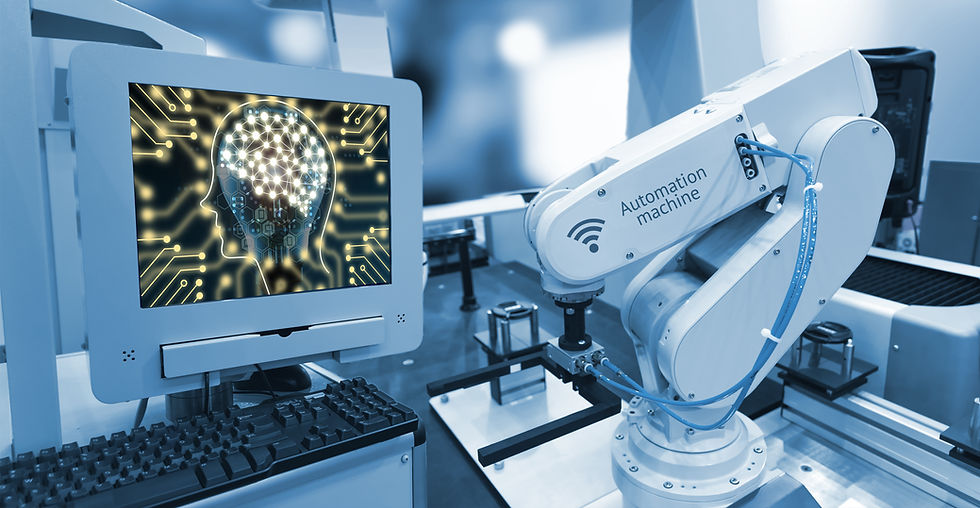4 Technologies Driving Digital Transformation in the Next Five Years
- Dec 22, 2020
- 4 min read

Four key technologies promise to drive digital transformation over the next five years. They are expected to shape small- and medium-sized business investment strategies and priorities across industry sectors.
Digital transformation marks a radical rethinking of how organizations use technology, people, and processes to fundamentally change business performance. In the next five years, key technologies—including AI, IoT, automation and blockchain—promise to better enable how companies use data-driven insights to improve operations and boost ROI.
1. Artificial Intelligence
Accenture defines AI as “a constellation of technologies—from machine learning to natural language processing—that allows machines to sense, comprehend, act, and learn."
Enterprises of all sizes can benefit from AI applications that optimize cloud processing, enable the deployment of faster computers, and boost operational efficiency. “AI is no longer a 'nice to have' or a set of cool tools to impress management," notes the Accenture report. “AI and data strategies are becoming the very core of business."
As AI becomes mainstream, companies need to develop strategic roadmaps for implementation over the next five years to ensure they have the right talent to integrate and scale new technology.
An early adopter in the use of AI for production is Midea Group, a Chinese electrical appliance manufacturer. Midea is implementing digital tools and deploying robotics as part of a strategic transformation of its production processes. For example, the Chinese company worked with Intel to build an AI-based cloud platform to increase the accuracy and efficiency of its product inspection processes. The use of AI is also helping Midea launch edge computing solutions that improve production efficiency, while reducing system load and operating costs.
2. The Internet of Things (IoT) and 5G
As the new 5G wireless standard is deployed worldwide, it promises to accelerate IoT solutions—with speeds as much as 100 times faster than 4G. 5G will also “allow next-generation networks to compete head-on with wired broadband systems, including those built with today's fastest fiber-optic technology," notes a Harvard Business Review (HBR) report.
A more connected economy will be fueled by the evolution of IoT over the next five years.
Retail is just one example of how 5G and IOT solutions are impacting the global economy. As the Harvard Business Review notes, “digital transformation is spurring innovation and new business models across virtually all industrial and commercial sectors."
3. Automation
Automation is a cornerstone of digital transformation technology. Gartner defines automation as the way organizations use technology to accomplish tasks that once required human judgment or action. Now, a new era of what Gartner calls “hyperautomation" will feature advanced computing technology—including AI and machine learning—to rapidly identify and automate all possible business processes.
As the Gartner report notes, hyperautomation extends across a range of tools that can be automated, but also refers to the use of technology to discover, analyze, design, automate, measure, monitor, and reassess business processes and data.
Lamborghini is already using hyperautomation to improve production efficiency on its new Urus SUV. The automaker worked with KPMG to develop an Industry 4.0 IT platform that uses the industrial IoT to configure assembly processes. The factory features an unprecedented modular design, using digital sensors and robots in a collaborative and connected environment.
Each vehicle moves through Lamborghini's production floor via automatic guided vehicles that autonomously transport the car to the appropriate work island. Electronic monitoring of the production process provides data insights that are available instantly, giving workers control over every aspect of production, on site or remotely.
4. Blockchain
The fourth technology poised to impact digital disruption over the next five years is blockchain technology. Blockchain, which is evolving beyond crytocurrenices like Bitcoin, will give companies across industry sectors the ability to use a secure distributed ledger for everything from contracts and transactions to financing and recordkeeping. A distributed ledger is a secure database that is shared by multiple consenting parties, and synchronized across multiple sites, companies and/or locations. Blockchain provides an open, distributed ledger that can record transactions between multiple parties in a verifiable and permanent way.
One area where blockchain is already proving its worth is in global supply chains.
The Digital Future
The convergence of AI, IoT, automation, and blockchain means that business leaders need to think about how these technologies can be integrated into their day-to-day operations.
“An organization has a far better chance at succeeding when its operating model—or how the organization creates value—is aligned to its strategy," concludes a report in the HBR. “The good news for companies born before the digital era is that they often quickly understand the value in transforming to agile, adaptive, and responsive enterprises because they already have the other intangibles in place: Strong brands, an entrenched customer base, established sales methods, and partners—suppliers, distributors, and technology."
Looking ahead, companies of all shapes and sizes—from start-ups to centuries-old brands—must understand how to use new technology to effectively achieve meaningful digital transformation in their corner of the global business ecosystem.
Companies that integrate digital technologies could reap a savings of more than $85,000 per employee, according to an Accenture report. Schneider Electric, a French energy-management company, for example, is using AI to help its equipment automatically adapt to changing environmental conditions—reducing overall downtime and improving asset utilization for its clients.
Leveraging combinations of advanced digital technologies, concludes Accenture, helps businesses “continuously create new, hyper-personalized experiences in both a business-to-consumer and business-to-business context."

Comments